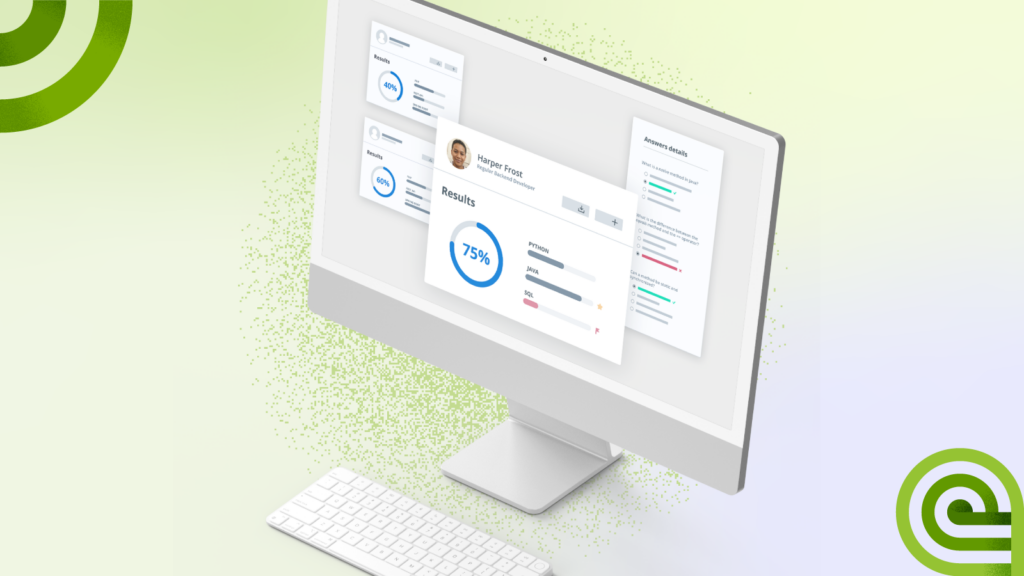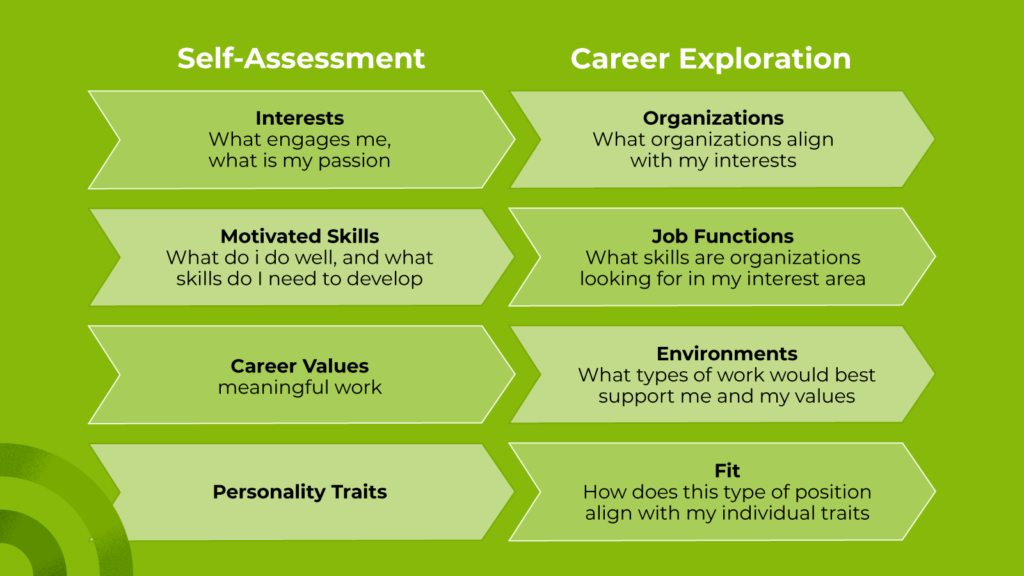
Finalidad e impacto en la evaluación de las herramientas de evaluación de competencias

¿Alguna vez se ha parado a reflexionar sobre los exhaustivos e intrincados mecanismos que aplican las organizaciones para evaluar el talento, valorar el potencial y cribar grandes volúmenes de datos?
¿Cómo se aseguran estas entidades de que toman decisiones no sólo informadas, sino también predictivas de futuros éxitos?
La respuesta está en el cautivador mundo de evaluación de competencias. Estos métodos, que a menudo se pasan por alto, son la espina dorsal de muchas decisiones estratégicas.
Son el motor entre bastidores que permite a los establecimientos funcionar con una exactitud, precisión y visión de futuro inigualables.
Abrazando herramienta de evaluación de competenciasLas organizaciones de la sociedad de la información están equipadas con herramientas que ofrecen una comprensión más profunda tanto de los escenarios actuales como de las posibles trayectorias futuras, garantizando que permanezcan a la vanguardia de sus respectivos sectores.
Introduction to skills assessment tools
Skills assessment tools are designed to evaluate an individual’s abilities in specific areas. They offer an objective measurement of knowledge, skills, and competencies, providing valuable data for various purposes, such as:
- Hiring and recruitment: Identifying the best candidates from a pool of applicants.
- Desarrollo de los empleados: Pinpointing skill gaps and providing targeted training.
- Performance evaluation: Providing insights for performance reviews and promotions.
- Planificación de la sucesión: Identifying high-potential employees and their future roles.
The importance of assessing employee skills
In today’s rapidly changing work environment, where skills can quickly become outdated, assessing employee skills is more critical than ever. By understanding the existing skill sets within an organization, businesses can:
- Optimize workforce planning: Ensure the organization has the right people with the right skills to meet current and future needs.
- Boost employee engagement: Employees feel more valued and motivated when they are given opportunities to develop and grow their skill sets.
- Improve productivity and efficiency: When employees possess the skills required for their roles, they perform their tasks more effectively.
- Gain a competitive edge: Organizations with a skilled workforce are better positioned to innovate, adapt to change, and outperform their competitors.
Understanding the different types of skills assessments
Skills assessment tools encompass a wide array of formats and methodologies, each tailored to evaluate different types of skills. This variety ensures you can choose the most effective tool for your specific needs. Let’s delve into some common types:
Technical skills
These assessments evaluate an individual’s proficiency in specific technical areas, such as programming languages, software applications, or mechanical aptitude. Examples of technical skills assessments include:
- Coding challenges: Assessing a candidate’s ability to write and debug code in a specific programming language.
- Software simulations: Evaluating a candidate’s proficiency in using specific software programs, such as Microsoft Excel or Adobe Photoshop.
- Knowledge tests: Measuring an individual’s understanding of technical concepts and principles.
Habilidades sociales
Unlike job-specific technical skills, competencias interpersonales are transferable across various roles and industries. They relate to how an individual interacts with others, approaches their work, and manages their time. Examples of soft skills assessments include:
- Situational judgment tests: Presenting candidates with realistic scenarios and asking them to choose the most appropriate course of action.
- Behavioral interviews: Assessing a candidate’s past behavior as an indicator of their future performance.
- Personality questionnaires: Measuring personality traits, such as teamwork, communication, and problem-solving abilities.
Cognitive abilities
These assessments measure an individual’s mental capabilities, such as their ability to learn, solve problems, and think critically. These assessments provide insights into an individual’s potential to learn new information and adapt to different situations. Examples of cognitive ability assessments include:
- Aptitude tests: Assessing general intelligence, verbal reasoning, and numerical abilities.
- Logical reasoning tests: Evaluating an individual’s ability to identify patterns, analyze arguments, and draw logical conclusions.
- Spatial reasoning tests: Measuring an individual’s ability to visualize and manipulate objects in space.
Personality assessments
While not strictly skills assessments, personality assessments provide valuable insights into an individual’s work style, preferences, and how they interact with others. Understanding personality traits helps create compatible teams and predict job satisfaction. Some commonly used personality assessments include:
- Myers-Briggs type indicator (MBTI): Categorizes individuals into 16 personality types based on their preferences for extraversion/introversion, sensing/intuition, thinking/feeling, and judging/perceiving.
- DiSC assessment: Measures an individual’s dominance, influence, steadiness, and conscientiousness, providing insights into their communication style and work preferences.
- Enneagram: Identifies nine interconnected personality types, each with its own set of motivations, fears, and desires.

Evaluation criteria for choosing the best skill assessment tool
Finding the perfect skill assessment tool for your company is crucial to building strong teams and making informed hiring decisions. With so many options available, it’s essential to know what to look for before investing in a particular platform. When evaluating a herramienta de evaluación de competencias consider these key factors to make the best choice for your organization.
User interface and experience
A user-friendly interface is critical for both the test taker and the administrator. The platform should be intuitive and easy to navigate, allowing candidates to focus on demonstrating their skills without struggling with a clunky interface.
Assessment accuracy and relevance
The assessment tool should accurately measure the skills and competencies relevant to the job. Look for tools like DevSkiller TalentScore, which uses real-world programming assignments to evaluate technical skills. DevSkiller, a leading TalentTech solution, offers a range of assessments covering various technologies, including Cloud, Cybersecurity, and Data Science. With a library of over 5,000 tasks, you can be confident in finding assessments that align with your specific requirements.
Cost and subscription plans
Consider your budget and the scalability of the tool. Evaluate the pricing plans and ensure they align with the size of your team and the number of assessments you need.
Customization options
Each organization has unique needs. Look for a herramienta de evaluación de competencias that offers customization options. Can you tailor assessments to match specific job roles or skills frameworks? The ability to customize ensures the assessments are relevant and effectively evaluate the skills that matter most to your organization. DevSkiller, for example, allows for customization through its TalentScore platform, enabling you to create assessments that mirror real-world job scenarios.
Support and resource materials
Implementing and using a new tool can raise questions. Choose a provider that offers excellent customer support and provides resources like documentation and tutorials. This will ensure a smooth experience and allow you to get the most out of your investment.

Benefits of implementing skills assessment in the workplace
Let’s dive into the advantages of integrating skills assessment tools into your company’s workflow.
Enhanced employee development and engagement
Skills assessments provide valuable insights into your employees’ strengths and areas for improvement. This data allows for creating targeted training programs that address specific carencias de competencias and foster professional growth.
But that’s not all! By understanding their strengths, employees can focus on tasks and projects that align with their abilities, leading to increased job satisfaction and engagement. A study published in the Journal of Applied Psychology found that employees who perceive their skills are being utilized effectively are 67% more likely to be engaged in their work.
More effective hiring and recruitment processes
Skills assessment tools can revolutionize your hiring process. By incorporating them into the early stages of recruitment, recruiters can objectively evaluate candidates based on their demonstrated abilities, not just their resumes. This allows for a more efficient screening process, ensuring that only the most qualified individuals move forward. A study conducted by Harvard Business Review found that using skills assessments during the hiring process can reduce employee turnover by as much as 46%.
Improved workforce performance analytics
Skills assessments provide a data-driven approach to workforce planning. By analyzing the collective skills data of your workforce, you gain valuable insights into the overall strengths and weaknesses within your organization. These insights allow you to identify skill gaps, anticipate future talent needs, and make informed decisions regarding training and development initiatives, leading to a more competent and adaptable workforce.

Impacto en el desarrollo
Crecimiento personal y aprendizaje
Al igual que un espejo muestra fielmente nuestro reflejo, los programas informáticos de evaluación de competencias actúan como ventanas reveladoras de nuestras competencias, base de conocimientos y posibles áreas maduras para el desarrollo.
No se limitan a presentar una instantánea, sino que ofrecen un retrato dinámico y evolutivo de nuestro progreso y potencial.
Estas herramientas, que sirven de brújula en nuestras odiseas educativas y profesionales, nos mantienen alineados con nuestros objetivos, destacando los hitos alcanzados y señalando las áreas que invitan a seguir explorando.
En este viaje continuo de crecimiento y descubrimiento, la herramienta de evaluación de competencias sigue siendo nuestra guía inquebrantable, que garantiza que cada paso que damos tiene un propósito y va en la dirección correcta.
Desarrollo organizativo
Para el mundo empresarial, las herramientas de evaluación de competencias no son meras ayudas, sino pilares fundamentales que sustentan la prospectiva estratégica.
Funcionan como los ojos y los oídos de una empresa, observando con agudeza los cambios del mercado, evaluando la dinámica del equipo y trazando objetivos visionarios.
These tools provide the metrics and insights that shape decision-making, ensuring businesses are not only reactive but also proactive in their approach.
Reflexione sobre esta analogía: navegar por un vasto océano a bordo de un barco, desprovisto de brújula o de cualquier ayuda a la navegación. Es similar a una empresa que se aventura en el mercado competitivo sin la guía de herramientas de evaluación.
Estas herramientas son la brújula, las estrellas y el mapa, que garantizan que la organización no vaya simplemente a la deriva, sino que navegue con rumbo y propósito.
Elegir la herramienta adecuada a sus necesidades
No todas las herramientas son iguales. Dependiendo de tus objetivos, tendrás que seleccionar la que mejor se adapte. Es como elegir entre un martillo y un destornillador; ambos son útiles, pero para tareas distintas.
Detailed guide on using skills assessment tools effectively
Employing the right individuals is paramount to any organization’s triumph. However, pinpointing candidates possessing the precise blend of proficiencies can prove to be an arduous endeavor. Fortunately, skills assessment tools present a streamlined approach to gauging an individual’s capabilities. This detailed guide delves into the best practices for utilizing these tools effectively.
Best practices for administering tests
When incorporating skills assessment tools into your process, it is critical to guarantee a level playing field for all candidates. This begins by meticulously selecting assessments that align with the specific requisites of the role you aim to fill.
Let’s explore some recommended practices for administering tests:
- Crystal-clear instructions: Providing clear, concise instructions to test-takers is paramount. This clarity ensures individuals understand what is expected of them, enabling them to concentrate on showcasing their abilities without unnecessary confusion.
- Proctored environment: Establishing a proctored setting for test administration is crucial to uphold the integrity of the assessment process. Proctoring can be executed on-site or remotely, utilizing specialized software, and aids in mitigating any potential for cheating or distractions.
- Time limits: Employing time constraints, when appropriate, can provide valuable insights into an individual’s ability to perform under pressure, mirroring real-world scenarios often encountered in the workplace.
Creating a culture that values continuous learning
Integrating skills assessment tools into your organizational framework extends beyond mere recruitment; it’s about fostering an environment that champions continuous learning. When employees are empowered to identify areas for improvement and seek growth opportunities, it not only benefits their individual trajectory but also contributes significantly to the overall success of the organization.
Consider these strategies to nurture such a culture:
- Regular skill assessments: Conducting routine skill assessments helps maintain a pulse on your team’s proficiencies. This practice enables you to identify any skill gaps that may be surfacing and allows for timely intervention through targeted training programs.
- Personalized feedback: The power of constructive feedback cannot be overstated. By providing personalized feedback following each assessment, you equip individuals with the insights they need to grasp their strengths and pinpoint areas that warrant attention. This, in turn, empowers them to forge a tailored development strategy.
- Access to learning resources: Cultivating a growth mindset within your team necessitates providing them with readily available learning resources. Online courses, workshops, and mentorship programs are just a few avenues you can leverage to encourage continuous development.
El futuro de las herramientas de evaluación
El horizonte de las herramientas de evaluación de competencias se amplía exponencialmente. Imagínese un panorama en el que la IA no se limita a hacer números, sino que descifra patrones y ofrece perspectivas predictivas.
Imagínese un mundo en el que las evaluaciones no se limiten a hojas de cálculo, sino que cobren vida a través de experiencias inmersivas de realidad virtual que proporcionen una comprensión holística. Los avances que estamos presenciando no son meros cambios graduales, sino saltos transformadores.

En la cúspide de esta nueva era, la promesa es clara: un futuro en el que la toma de decisiones no se base en corazonadas, sino en conocimientos sólidos basados en datos.
¿Y lo más emocionante? Estos profundos conocimientos, que antes requerían una investigación y un análisis exhaustivos, pronto estarán al alcance de nuestra mano, a un solo clic de distancia. ¿Estamos preparados para este emocionante viaje al futuro de las evaluaciones?
Conclusión
Estar al corriente de los acontecimientos y tomar decisiones acertadas nunca ha sido tan vital. En un segundo plano, a menudo desapercibidas, se encuentran las herramientas de evaluación de competencias, los pilares silenciosos que sustentan este proceso.
Estas herramientas, con su precisión y capacidad de análisis, garantizan que las decisiones no se basen en meras conjeturas, sino en datos empíricos sólidos.
Agilizan los procesos, optimizan la eficiencia y allanan el camino para un crecimiento sostenible. Así que, la próxima vez que te encuentres con una herramienta de este tipo, ya sea una simple encuesta o una sofisticada plataforma de análisis, tómate un momento para apreciar su profundo significado.
Porque en sus algoritmos y métricas reside el poder de forjar futuros e impulsar cambios transformadores.
Descubra cómo puede ayudarle la herramienta de evaluación de competencias DevSkiller.
Programe una demostración con uno de nuestros expertos en productos o vea este rápido Vídeo de demostración de 5 minutos para saber más.
Preguntas frecuentes
- ¿Cuáles son algunos ejemplos de herramientas de evaluación?
Algunos ejemplos son las encuestas, los cuestionarios, los formularios de opinión y el software de análisis del rendimiento. - ¿En qué se diferencian las herramientas de evaluación de las habituales?
Mientras que las herramientas habituales pueden ofrecer datos, las herramientas de evaluación aportan ideas, análisis y comentarios procesables. - ¿Pueden las personas utilizar las herramientas de evaluación para su crecimiento personal?
Por supuesto. Muchas herramientas están diseñadas para uso personal con el fin de medir las habilidades, los intereses y las áreas de mejora. - ¿Cómo se benefician las empresas de estas herramientas?
Ayudan en la planificación estratégica, la evaluación de los empleados, el análisis del mercado y mucho más. - ¿Hay algún inconveniente en depender en gran medida de las herramientas de evaluación?
Aunque ofrecen numerosas ventajas, es esencial garantizar la precisión de la herramienta y su pertinencia para el contexto en el que se utiliza.




